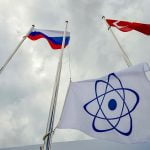The European Union is moving ahead with ambitious plans for a common purchase of gas to curb prices by early May; part of a scheme approved by the EU Council in mid-December.
This is a rare case where Brussels is making a purely political decision that will be very difficult to implement, Chris Weafer, co-founder of Macro-Advisory in Tashkent, Uzbekistan, told NE Global, adding that in 2022, countries prioritized their own energy security and have been buying gas to ensure no supply risk for themselves.
The EU plan to centralize purchases will only work if Brussels can show it is getting the best price for the gas it buys and, critically, if there is enough gas to satisfy each of the European Union members’ requirements.
“If any country, especially big gas buyers like Germany or Italy, think they can get better price terms then they will not use a centralized buyer. That would be foolish. If there isn’t enough gas, then those with buying power, such as Germany and Italy, are much more likely to go to the market and secure their own supply,” said Weafer.
The global gas supply market will be much tighter this year than it was in 2022. This is partly because Russian supplies will be significantly less in 2023. The need for the EU to buy more gas, especially more liquified natural gas (LNG), from elsewhere will be greater.
Unlike oil, gas cannot be switched to an Asian buyer.
The gas supply market will also be tighter this year because China has returned as a major buyer of LNG. Last year, China was not a major buyer because its economy was still in full COVID lockdown. It imported the equivalent of 42 billion cubic meters of LNG, less than usual, and most of the available LNG went to Europe. Competition for LNG cargo in 2023 will be tougher and prices will be higher.
“I cannot see major EU economies trusting a centralised buyer in such a difficult market. They have their own tried and trusted traders,” Weafer said. “This is another example of political economics. Officials are making wishful thinking assumptions to justify a political ambition,” Weafer said, adding, “The reality is, assuming Russian gas export volumes stay as they have been through this past winter and the EU gas demand also remains unchanged, Europe will have to deal with a difficult balancing act for probably two to three more winters.”
Building the infrastructure to import gas from major suppliers like Azerbaijan and building more LNG production and delivery infrastructure will take years. Europe will again be forced to keep a close watch on both the weather and China’s gas demand next winter.
Katja Yafimava, a senior research fellow at the Oxford Institute for Energy Studies, told NE Global the key point about the common gas purchasing mechanism is that the EU companies’ participation in the aggregation of demand is mandatory, at least in the amount equal to 15% of storage filling targets, whereas their participation in actual purchasing is voluntary.
No supplier can be forced to sell its gas at what essentially would be an administrative price offered by the Platform Service Provider.
“If it (a company) doesn’t sell its gas at that price, it can sell it to an EU member outside the platform at a market price, or sell it outside Europe in case of LNG. Although some gas could be sold/bought through the platform, I don’t think the volumes are going to be very significant,” Yafimava explained, adding, “There’s likely to be continued purchases of gas outside the platform, and possibly some lower-scale purchases through the platform”.








